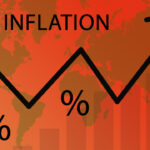The biggest surprise on the financial markets this year is that inflation is continuing. While investors had hoped not long ago for 4 interest rate cuts by the Fed this year, there are now only 3, and with a significant delay. This underpins the thesis we have often expressed that central banks do not fully understand the dynamics of the current inflation. The indicators suggest that parts of the economy, such as real estate and the automotive sector, are struggling with high interest rates, while other sectors, such as the defense industry, the semiconductor industry, the AI industry and the manufacture of anti-obesity drugs, are experiencing a boom. So, after the pandemic, due to new IT technologies and the war in Ukraine, a two-speed economy has emerged, where monetary policy is more difficult, as supporting the weak parts of the economy can go hand in hand with persistent inflation, which is more costly for companies.
Investors try to glean from the Fed’s statements the level of future interest rates (i.e. how much the money – the loans – will cost businesses in the future). It is often the case that the worse the situation in the economy is, the higher share prices rise as investors hope that in response to weak economic data, the Fed will cut interest rates to stimulate the economy. Just yesterday (July 3, 2024) we had an example of this: the ISM index for the service sector collapsed and – excluding the Covid-19 pandemic – fell to its lowest level in almost 15 years. And Wall Street hit record highs in response.
So investors believe this two-speed economy will continue to work. Meanwhile, fiscal spending in the US is unsustainable in the long term and current government bond yields are increasing government spending related to debt, taking away funds for citizen welfare and infrastructure. The US government has to deal with the risk of an economic slowdown or risk letting inflation run high for longer. So the scenario is: whether Democrats or Republicans win, they will have to increase spending (read: inflation), which will cause the Fed to perhaps raise interest rates even higher.
Investors need to understand that the real killer for stocks is recession, not inflation. Yes, I know that the examples, such as the behavior of the stock markets in Turkey or Argentina, clearly show that high inflation need not be a particular problem for equities in the long term. But one day the moment will come: even large companies will not be able to generate higher profits in the face of expensive loans, high taxes and wages. On that day, it will no longer be worth putting money into shares. Even in the USA.




